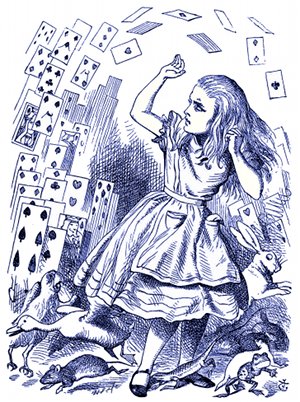Reversible Klondike
Alternate History Solitaire
Klondike Solitaire
Generally I am not one for intense board-games or table-games, play that involves considerable passion and concentration. Those resources of mine are expended elsewhere. But I occasionally like to play simple games for relaxation, for a change of pace. One of my favorites for solitaire computer play is a variation I call Reversible Klondike.
Klondike is a traditional form of single-person card game, a solitaire or patience game. Klondike was invented by Richard A. Canfield for his gambling resort at Saratoga Springs in the 1890s. It probably is the most recognizable solitaire card game, and the rules are fairly simple. So far, so good.
In my group of school pals, we've long had a propensity to make off-the-shelf games a little more challenging and elaborate. Perhaps extending the standard-sized board, for instance, of hexagon-based board games; or for manufactured boards, placing several side by side.
Now we come to alternate history. From the mid-1930s, and especially from the 1950s, the idea of branching lines of history became a small but recognized subspecies of science fiction. What would the world be like if Caesar had decided against crossing the Rubicon, or Churchill had gone to the Dardanelles to command in person the Anglo-French naval effort? H. Beam Piper's Paratime series is an early exemplar of branching timelines, and one of the best.
How do we apply this to playing cards? Well, in certain games, a player can take back a play or move if the other player hasn't already made his own next move. In Klondike, much depends on the luck of the turn, that is, which face-down cards turn up on which piles in which sequence.
So let's apply a rule-change to one of the more-or-less standard varieties of Klondike, to allow not only a single Undo but unlimited Undos, if necessary all the way back to the initial layout. After these "backward" Undo(s), we can play cards "forward" as before. We've selected, on our tiny scale, a tactical choice to replay in an alternate way, creating a new alternate history of this particular game of Klondike. A far safer procedure than ascending the sigma-sequence in James Blish's Jack of Eagles.
 Is it possible to play Reversible Klondike manually, with physical cards? Sure, but one would need a phenomenally good memory. In my own alternate or out-of-phase but lofty history, I postulate that Reversible Klondike was invented about the year 1900 by Downie Goldsmith, a lady with such a memory: a physicist and polymath. A superb card expert like John Scarne might be able to do Reversible Klondike manually, and I suppose the sort of abstract heads that can play chess in their minds without a board could do it. I can't.
Is it possible to play Reversible Klondike manually, with physical cards? Sure, but one would need a phenomenally good memory. In my own alternate or out-of-phase but lofty history, I postulate that Reversible Klondike was invented about the year 1900 by Downie Goldsmith, a lady with such a memory: a physicist and polymath. A superb card expert like John Scarne might be able to do Reversible Klondike manually, and I suppose the sort of abstract heads that can play chess in their minds without a board could do it. I can't.
(Note, January 2019: My novel Sphinx Daybreak (published 2018) introduces the brilliant Downie Goldsmith casually playing at Reversible Klondike, and the Chinese board game Go, simultaneously.)
Enter the personal computer with a bit-mapped screen: the Apple Macintosh, in 1984. Michael A. Casteel began developing his shareware version of Klondike for Macintosh that same year. This is a fine application for playing more-or-less standard variations of Klondike (there are options; it comes with other solitaires, too). See Casteel's site for sample layouts, rules, and so on.
Importantly to our purpose, it allows computerized Undos. Casteel's Klondike retains a complete memory of cards played — in the currently active timeline, the alternate history of our current Klondike session. This memory is of marginal value in normal play, but is ideal for Reversible play. So we can back out our plays, looking for missed chances based on what we've learned about those cards revealed by later turns.
Reversible Klondike does not eliminate all unplayable shuffles of the deck, which would give us a space-time omnipotence in the tiny world of the card deck. What it does give us is the ability to be a temporal traffic cop for the play of cards, a microcosmic analogy of H. Beam Piper's Paratime Police.
How to score Reversible Klondike? I generally don't bother to keep scores on games I play for myself. You may want to score it somehow, or you may just prefer the challenge of standard Klondike. Of course, similar computerized games with unlimited Undos can be reversed as well. If you decide to try Reversible Klondike, you may find that it's a mental challenge of — shall we say — an alternate kind.
© 2010 Robert Wilfred Franson
"You're Nothing But a Pack of Cards!"
by John Tenniel
for Alice's Adventures in Wonderland
by Lewis Carroll
at Old Book Art
Gaming at Troynovant
games, sports, strategy, tactics
| Troynovant, or Renewing Troy: | New | Contents | |||
| recurrent inspiration | Recent Updates | |||
|
www.Troynovant.com |
||||
|
Essays:
A-B
C-F
G-L
M-R
S-Z
|
||||
| Personae | Strata | Topography | |
|
|||